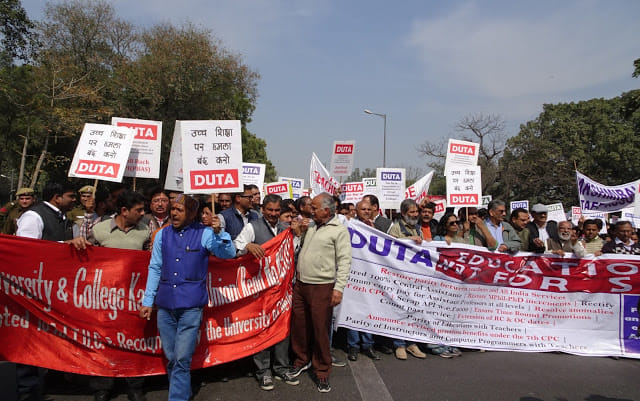Curzon, Viceroy of British India, had brought in the Indian Universities Bill to give larger control to the govt, but had to amend it after stiff opposition.
New Delhi: Teachers at central universities allege that the Narendra Modi government is doing what Lord Curzon tried to do in 1903, but couldn’t — turn them into government servants.
By imposing the Central Civil Services (Conduct) Rules on teachers at central universities — which restricts their freedom to criticise the government and its functioning — the government is almost replicating the Indian Universities Bill brought in by Curzon when he was Viceroy of India.
The bill tried to curtail the freedom of Indian universities by restricting their powers and giving larger control to the government.
Also read: There are just 40 foreign teachers at IITs despite govt’s big push for global faculty
“What Lord Curzon could not do in 1903, Modi government is trying to do now,” said Aditya Narayan Mishra, a Delhi University teacher who represents the Federation of Central Universities’ Teachers’ Association (FEDCUTA).
Rajesh Jha, also of the Delhi University, agreed: “Lord Curzon still lives through CCS rules. Many government universities have fallen prey to the rules and JNU is the latest to fall for it.”
Curzon’s bill
Curzon was the Viceroy of British India from 1899 to 1905, and tried to “reform” the education system in India. For this, he constituted the Indian Universities Commission in 1902. The commission was to study the state of education in the country and suggest measures to improve the standards.
The commission submitted its report in June 1902 and its major recommendations included more legal powers to the older universities, which would have senate members appointed by the government. University teachers did not have any representation in the senate initially.
The recommendations invited severe criticism and were considered a step towards destroying the limited independence of Indian universities.
A document accessed by ThePrint shows that Pandit Madan Mohan Malaviya had said at the 19th session of the Indian National Congress in Madras that if passed, the bill would turn institutions into government departments.
“University Bill, if passed into law, will have as recommended in the report of Universities Commission, the effect of restricting the area of education and completely destroying the independence of the universities, upon which largely depend the efficacy and usefulness and turning them practically into departments of government,” the Congress resolution had said.
The Congress had then recommended that “each university should be dealt with by a separate act”.
After the criticism, the bill was amended and universities were given powers to be run as autonomous bodies.
What’s happening now
The University Grants Commission sent a letter to all central universities in May to adopt the CCS rules. Universities are still in the process of adopting them.
“What was resisted by the Congress many years ago has now been adopted by the Modi government. The CCS rule is very toxic for an academic environment and all universities must resist it. They are not realising it now, but they will have to pay the price for adopting the rule,” said Mishra.
As per the CCS rules, “no government servant shall be a member of, or be associated with, any political party or any organisation which takes part in politics nor shall he take part in, any political movement or activity”, or “publish or say anything which is critical of the central government”.
This means that academicians will have to seek permission from higher authorities in the university for everything — for writing a piece in a newspaper, grievance redressal, or even making representation of misgovernance against higher authorities.
Also read: Diktat for teachers at central universities like JNU & DU: Can’t criticise govt
A university teacher, who did not wish to be identified, explained: “For example, making a representation to the vice-chancellor against the principal will require the consent of the principal, which is evidently oxymoronic.”
A senior official in HRD Ministry has, however, dismissed these concerns.
“There is nothing wrong with the CCS rule, we (bureaucrats) are also governed by this rule. The job of a teacher is to teach and let the university function in a normal way. They should do that,” the official said.






